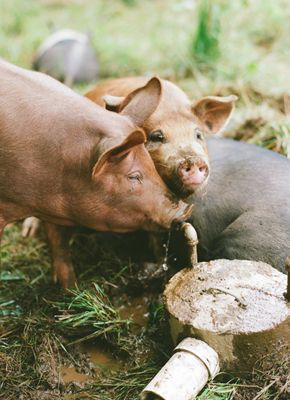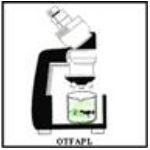VETM 1004 Outline
1. Purpose of the Course
This course is to introduce the student of Veterinary Medicine to the World of Animals from the standpoint of production, growth, economics and farm management. It is the one of three courses in which the student will be exposed to domestic and non-domestic animal species. It was designed specifically for the students in the five (5) year degree programme in Veterinary medicine. back to top
January 19th to February 21st, 2015
Lectures:
Wednesdays 1:00pm-3:00pm (SVM Amphi)
Fridays 11:00am-12:00 noon (SVM Amphi)
February 24th to April 18th, 2015
Lectures:
Wednesdays 1:00pm-3:00pm (SVM Amphi)
Thursdays 8:00am-9:00am (SBB 001)back to top
- To have an understanding of the Basic Principles of Pig Production and to be able to explain the concepts as outlined in Part 1 of the course objectives.
- To have an understanding of the Basic Principles of Poultry Production and to be able to explain the concepts as outlined in Part 2 of the course objectives.
- To have an understanding of the Basic Principles of Animal Welfare and to be able to explain the concepts as outlined in Part 3 of the course objectives.
- To have an understanding of the Basic Principles of Aquaculture and to be able to explain the concepts as outlined in Part 4 of the course objectives.
4. Course Content
This course contains an introduction to and concepts involved in Pig Production, Poultry Production, Animal Welfare and Aquacultures. back to top
5. Course Organization
This course is organized into four (4) parts that would be taught by different persons as follows:
- Part 1: Introduction to Pig Production - Dr. Ridley Holder (33% of this course)
- Part 2: Introduction to Poultry Production - Mr. Cicero Lallo (33% of this course)
- Part 3: Introduction to Animal Welfare - Dr. Gabriel Brown (25% of this course)
- Part 4: Introduction to Aquaculture – Dr. Carla Phillips (8% of this course)
-
- 1.1 Farrowing to finishing operations
- 1.2 Target Performance Coefficients
- 1.3 Avoiding and eliminating diseases
- 1.3 Breeds of swine
- 1.4 Replacement gilts
- 1.5 Pregnant females
- 1.6 Lactation
- 1.7 Sows between weaning and rebreeding
- 1.8 The boar
- 1.9 Piglets between birth and weaning
- 1.10 Nursery pigs
- 1.11 Growers and finishers
-
-
| Date | Time & Place | Topic | Name |
| Week 1 Wednesday 21st January | 1pm-3pm SVM Amphi | Dr Holder | |
| Friday 23rd January | 11am-12noon SVM Amphi | Dr Holder | |
| Week 2 Wednesday 28th January | 1pm-3pm SVM Amphi 7pm- 10 pm Slide Session Lecture Room B Sir Frank Stockdale Building Main Campus | Dr Holder Prof. Gary Garcia |
|
| Friday 30th January | 11am-12 noon SVM Amphi | Dr Holder | |
| Week 3 Wednesday 4th February | 1pm-3pm SVM Amphi | Dr Holder | |
| Friday 7th February | 11am-12 noon SVM Amphi | Dr Holder | |
| Week 4 Wednesday 11th February | 1pm-3pm SVM Amphi | Dr Holder | |
| Friday 13th February | 11am-12 noon SVM Amphi | Dr Holder | |
| Week 5 Wednesday 18th February | 1pm-3pm SVM Amphi | Quiz #1 | Dr Holder |
| Friday 20th February | 11am- 12 Noon SVM Amphi | Mr. Lallo | |
| Week 6 Wednesday 25th February | 1pm-3pm SVM Amphi | Mr. Lallo | |
| Thursday 27th February | 8am-9am SBB 001 | Mr. Lallo | |
| Week 7 Wednesday 4th March | 1pm-3pm SVM Amphi | Mr. Lallo | |
| Thursday 4th March | 8am-9am SBB 001 | Mr. Lallo | |
| Week 8 Wednesday 11th March | 1pm-3pm SVM Amphi | Mr. Lallo | |
| Thursday 12th March | 8am-9am SBB 001 | Mr. Lallo | |
| Week 9 Wednesday 18th March | 1pm-3pm SVM Amphi | Mr. Lallo | |
| Thursday 19th March | 8am-9am SBB 001 | Mr. Lallo | |
| Week 10 Wednesday 25th March | 1pm-3pm SVM Amphi | Dr Brown | |
| Thursday 26th March | 8am-9am SBB 001 | Dr Brown | |
| Week 11 Wednesday 1st April | 1pm-3pm SVM Amphi | Dr Brown | |
| Thursday 2nd April | 8am-9am SBB 001 | Quiz #2 [2 hours] | Poultry and Animal Welfare |
| Week 12 Wednesday 8th April | 1pm-3pm SVM Amphi | Dr Phillips | |
| Thursday 9th April | 8am-9am SBB 001 | Dr Phillips | |
| Week 13 Wednesday 15th April | 1pm-3pm SVM Amphi | Dr Phillips | |
| Thursday 16th April | 8am-9am SBB 001 | Dr Phillips |
Marks for VETM 1004 will be broken down as follows:
- Coursework (40%)
- Final Examinations (60%)
Coursework breakdown:
| Assessment | Weight |
| Mid Semester Quiz #1 | 20% |
| End of Semester Quiz #2 | 20% |
| Final Exam | 50% |
| Oral Exam | 10% |
| Total | 100% |
9. Teaching Strategies
This is a blended course, presented face to face in the classroom and also hosted on myelearning. Myelearning will provide the student access to all the content for the course including powerpoint slides that are used in class (to ensure that you pay attention to classroom discussions & activities without worrying about capturing information on slides) and other reading materials.
We will also use myelearning to mount online interactive activities such as quizzes, assignments, and choices, to enhance your knowledge of animal anatomy and physiology. In the classroom, we will use the traditional lecture, interspersed with short individual, pair, or small-group activities (PBL – Problem Based Learning) to ensure active learning. back to top
10. Lecturers and Communication
Course Coodinator:
| Prof. Gary Wayne Garcia Professor of Livestock Science |
Department of Food Production prof.gary.garcia@gmail.com gary.garcia@sta.uwi.edu 662-2002 Ext. 82598 Room 212, Sir Frank Stockdale Building Website: The Open School of Tropical Animal Science and Production |
Lecturers:
| Dr. Ridley Holder Lecturer – Pig Production |
Clinical Veterinary Sciences |
Mr. Cicero Lallo Lecturer in Animal Production |
Department of Food Production cicero.lallo@sta.uwi.edu 662-2002 ext. 83319 Room Sir Frank Stockdale Building |
| Dr. Gabriel Brown Lecturer – Animal Welfare and Aquaculture |
Clinical Veterinary Science School of Veterinary Medicine gabriel.brown@sta.uwi.edu 645-2640 ext. 4315, 4290 Room- Lab Animal Unit |
| Dr. Carla Phillips Lecturer in Veterinary Medicine |
School of Veterinary Medicine carla.phillips@sta.uwi.edu 645-2640 |
Office hours: All students can communicate on line with the Course Coordinator and Course Lecturers on Line through the Google Group e-Mail account. I would like to advise ALL students that they also get a GMail e-mail address. It has very useful electronic information storage and Transfer Features.
Communication policy: Use the course group email account. In this manner we could all communicate with each other 24 hours a day. All discussions must be polite.back to top
11. Attendances/Absences
Students are expected to attend most (75%), if not all, classes. Students absent during an exam or when an assignment is due must have an excused absence (requested in writing) to avoid being awarded a zero mark. Discuss any planned absences with the lecturer prior to the absence. Emergency absences should be discussed immediately after return to class. Medical excuses must be signed by a physician.
back to top
12. Required Reading
Course material would be provided by the individual lecturers electronically or through directed library or internet readings.back to top

